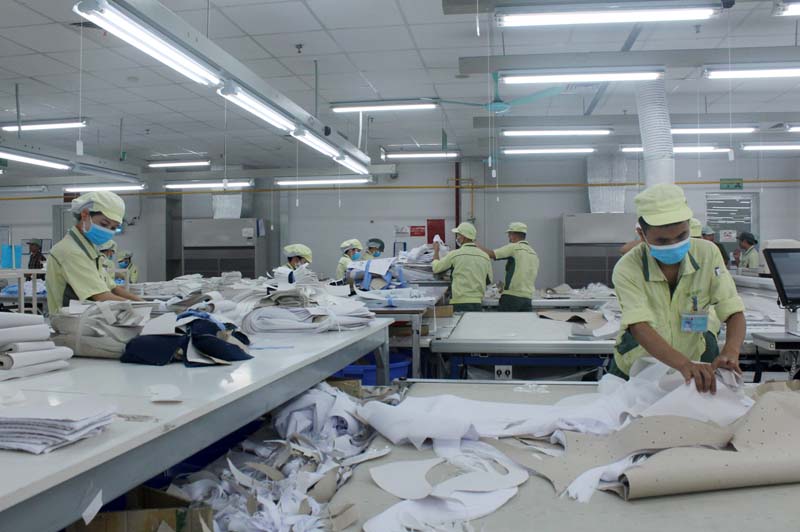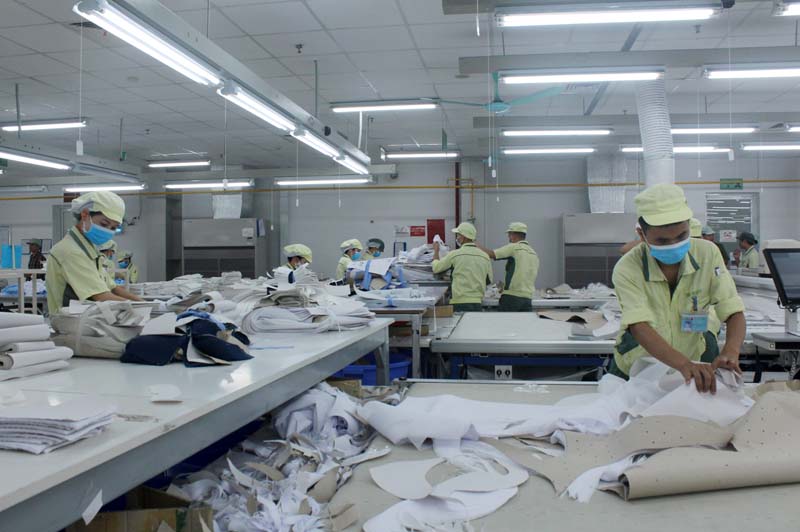
(HBO) – Many workers have returned to local industrial parks in the northern province of Hoa Binh after enjoying a week-long Lunar New Year (Tet) holiday, making contributions to helping their companies realise the set production and business targets for the whole year 2020.
 In
2019, besides robust business results, Midori Apparel Vietnam Co., Ltd (Luong
Son Industrial Park) worked to ensure social welfares for its labourers.
In
2019, besides robust business results, Midori Apparel Vietnam Co., Ltd (Luong
Son Industrial Park) worked to ensure social welfares for its labourers.
According
to the province’s management board of industrial parks, the province is housing
eight industrial parks, each spanning from 77-282 hectares and locating along
National Road No.6, Lang – Hoa Lac – Hoa Binh city road, and Ho Chi Minh road.
As of the end of 2019, the industrial parks had 95 valid projects, including 24
foreign direct investment projects with total registered capital of 499.75
million USD, and 75 domestic projects valued more than 7.27 trillion VND (312.9
million USD).
Most of the local firms have run smoothly, with 50 operational
projects that create jobs for 19,441 labourers.
Last year, enterprises at local industrial parks seen better revenues, export
value, and higher contributions to the state budget, as well as generate more
jobs as compared to 2018. They have observed regulations on planning,
construction, environmental protection and business and production.
Thanks to local efforts to improve the business climate and remove bottlenecks
for local firms, industrial parks in the province lured 15 new projects in
2019, equivalent to 187.5 percent of the yearly plan. Firms at the industrial parks
exported 633.17 million USD worth of products, contributed 180 billion VND to
the state budget, and created new jobs for 1,583 labourers, all surpassing the
set goals.
In 2019, the province gained nearly 37.4 trillion VND from industrial and
handicraft production, a year-on-year surge of 15 percent. Meanwhile, its export
revenue rose 24.48 percent to 791.9
million USD./.
According to data from the Hoa Binh Provincial Party Committee, the industrial production index for the first six months of 2025 is estimated to have increased by 20% compared to the same period last year. This marks the highest year-on-year growth rate for this period since 2020.
In the first six months of 2025, Hoa Binh province’s export turnover was estimated at 1.145 billion USD, marking an 18.11% increase compared to the same period in 2024. Import turnover was estimated at $ 804 million, a 17.15% increase, which helped the province maintain a positive trade balance.
The lives of the ethnic minority farmers in Tan Lac district have gradually improved thanks to the new directions in agricultural production. This is a testament to the collective strength fostered through the professional associations and groups implemented by various levels of the district’s Farmers’ Union.
With the motto the "product quality comes first,” after nearly one year of establishment and operation, Muong village’s Clean Food Agricultural and Commercial Cooperative, located in Cau Hamlet, Hung Son Commune (Kim Boi district), has launched reputable, high-quality agricultural products to the market that are well-received by consumers. The products such as Muong village’s pork sausage, salt-cured chicken, and salt-cured pork hocks have gradually carved out a place in the market and they are on the path to obtaining the OCOP certification.
In the past, the phrase "bumper harvest, rock-bottom prices" was a familiar refrain for Vietnamese farmers engaged in fragmented, small-scale agriculture. But today, a new spirit is emerging across rural areas of Hoa Binh province - one of collaboration, organisation, and collective economic models that provide a stable foundation for production.
Maintaining growing area codes and packing facility codes in accordance with regulations is a mandatory requirement for agricultural products to be eligible for export. Recently, the Department of Agriculture and Environment of Hoa Binh province has intensified technical supervision of designated farming areas and packing facilities to safeguard the "green passport" that enables its products to access international markets.



 In
2019, besides robust business results, Midori Apparel Vietnam Co., Ltd (Luong
Son Industrial Park) worked to ensure social welfares for its labourers.
In
2019, besides robust business results, Midori Apparel Vietnam Co., Ltd (Luong
Son Industrial Park) worked to ensure social welfares for its labourers.